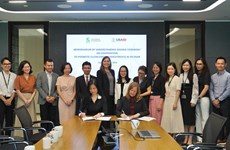Intergration boosts domestic firms
The country’s integration into the World Trade Organisation has
positively influenced a majority of domestic enterprises, according to a
Vietnam Chamber of Commerce and Industry survey.
The country’s integration into the World Trade Organisation has
positively influenced a majority of domestic enterprises, according to a
Vietnam Chamber of Commerce and Industry survey.
Implemented between July and November this year, over 3,300 enterprises are interviewed nation-wide. These firms are involved in areas such as construction, textiles and garments, agriculture, seafood processing, electronics, pharmaceuticals, engineering, banking and real estate.
Four years after the country joined the WTO, up to 80 percent of surveyed businesses said that their revenues has risen during 2007-10 while 9 percent confirmed unchanged figures, 8 percent experiencing unstable revenue changes and 3 percent witnessing declines.
Results showed that international economic integration was also a process of selection, said the Institute of Information Technology for Business Director Le Van Loi.
Those who fails to take advantage of new business opportunities will struggle in the long-run, he added.
Meanwhile, nearly half of interviewed firms considered product prices as their competitive factor, 40 percent said that they had advantages over other firms in seeking potential export markets and 30 percent explaining that unique products helped them enhance their competitive edge.
Product prices as competitive factor was by no means a positive indicator, Loi said.
A price reduction race can result in poor-quality raw materials, the use of labour exceeding the provision of law or failure to recruit high quality personnel.
Moreover, in the long-term, this competitive factor can inhibit businesses from accessing important market segments in which customers are willing to use expensive products or services, but require consistent quality, Loi noted.
The survey found that insufficient market information was the largest obstacle firms faced during the global integration process.
Cumbersome administrative procedures, which would need to be addressed, include difficulties in accessing credit resources and advanced technologies, poor appliance of e-commerce and other IT services. Inadequate assistance from the State and associations as well as harsher competition from foreign rivals and trade barriers at overseas markets are also problematic, the survey revealed./.
Implemented between July and November this year, over 3,300 enterprises are interviewed nation-wide. These firms are involved in areas such as construction, textiles and garments, agriculture, seafood processing, electronics, pharmaceuticals, engineering, banking and real estate.
Four years after the country joined the WTO, up to 80 percent of surveyed businesses said that their revenues has risen during 2007-10 while 9 percent confirmed unchanged figures, 8 percent experiencing unstable revenue changes and 3 percent witnessing declines.
Results showed that international economic integration was also a process of selection, said the Institute of Information Technology for Business Director Le Van Loi.
Those who fails to take advantage of new business opportunities will struggle in the long-run, he added.
Meanwhile, nearly half of interviewed firms considered product prices as their competitive factor, 40 percent said that they had advantages over other firms in seeking potential export markets and 30 percent explaining that unique products helped them enhance their competitive edge.
Product prices as competitive factor was by no means a positive indicator, Loi said.
A price reduction race can result in poor-quality raw materials, the use of labour exceeding the provision of law or failure to recruit high quality personnel.
Moreover, in the long-term, this competitive factor can inhibit businesses from accessing important market segments in which customers are willing to use expensive products or services, but require consistent quality, Loi noted.
The survey found that insufficient market information was the largest obstacle firms faced during the global integration process.
Cumbersome administrative procedures, which would need to be addressed, include difficulties in accessing credit resources and advanced technologies, poor appliance of e-commerce and other IT services. Inadequate assistance from the State and associations as well as harsher competition from foreign rivals and trade barriers at overseas markets are also problematic, the survey revealed./.













